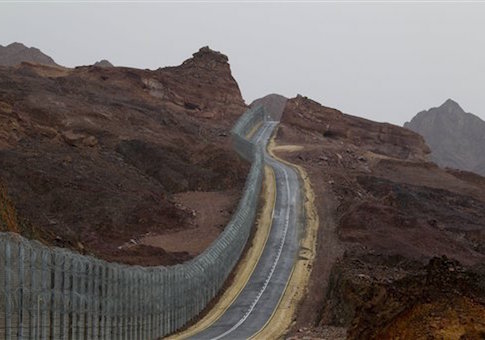JERUSALEM—Israel this month installed anti-missile systems on commercial flights to the southern resort city of Eilat to foil possible attacks from nearby Sinai by militant Jihadi groups affiliated with Islamic State (IS, also known as ISIS or ISIL).
The decision was taken after the militants staged a massive attack on Egyptian security forces two weeks ago in northeastern Sinai, an area adjacent to Israel. The attackers for the first time used sophisticated Russian anti-tank weapons and other modern weaponry. Israeli security authorities, anticipating the possibility of an attack on aircraft in the Eilat area, recommended the installation on all Israeli commercial aircraft flying there of an anti-missile system dubbed SkyShield.
The system, fitted into a removable pod slung under the aircraft, contains several sensors. Operating automatically, without human intervention, the system’s infra-red sensors detect a missile being fired, track it, and then uses a laser to disrupt the missile’s navigation system, divert it and detonate it at a safe distance.
The system was developed after terrorists in Mombasa, Kenya, in 2002 fired two shoulder-held missiles at an Israeli passenger plane, a Boeing 757, as it was lifting off. The missiles missed but then-Israeli Prime Minister Ariel Sharon authorized the development of an anti-missile system for Israeli commercial aircraft. Versions of such systems already existed for military aircraft. The planes will not use the system for flights to most other destinations since they add weight and interfere with the aerodynamic flow, requiring the use of additional fuel. But the pod can easily be installed within an hour, say officials, whenever or wherever there is possible danger.
"Israel is the first country in the world to find an answer to the threat to commercial aircraft," said Israeli Transportation Minister Israel Katz. It is not clear whether foreign charter airlines that fly directly from Europe to Eilat will seek to equip themselves with similar systems or land at another airport.
Although the area of the recent jihadi attack in Sinai was far from Eilat, other parts of the Egyptian-Israel border are within a few dozen miles of the city. Islamic groups have several times in recent years launched ground-to-ground rockets in the direction of the resort without causing casualties. Some have overshot and landed in Aqaba in neighboring Jordan.
During last summer’s war in Gaza, Hamas succeeded in shutting down Ben-Gurion International Airport for 36 hours when one of the hundreds of missiles it fired into Israel landed a mile from the airport. Following that, the Federal Aviation Authority prohibited American airlines from flying into or from the airport for 24 hours. The prohibition was extended for another 12 hours and other foreign airlines followed suit except for a few which accepted Israel’s offer to land at a military base in the southern Negev. Israeli planes continued to fly into and from Ben-Gurion throughout. New York’s then mayor, Michael Bloomberg, demonstratively flew to Israel the next day.
In the ongoing electronic battle against rockets and guided missiles, Israel’s Iron Dome anti-rocket system is the current champion, having intercepted close to 90 percent of rockets fired from Gaza that would otherwise have hit populated areas. Israel is presently developing a system, Iron Beam, designed to intercept mortar shells. The CEO of Rafael Advanced Defense Systems, Yedidia Yaari, which is developing the system, has said that when fully operational it will be able "to bring down mortar shells like flies".
